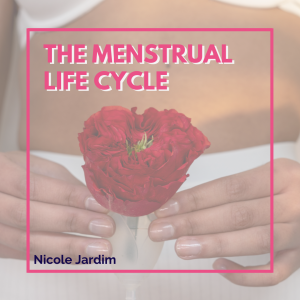Your period will evolve from the time you start menstruating throughout the course of your life.
Yep, your period grows and changes with you! 🌱
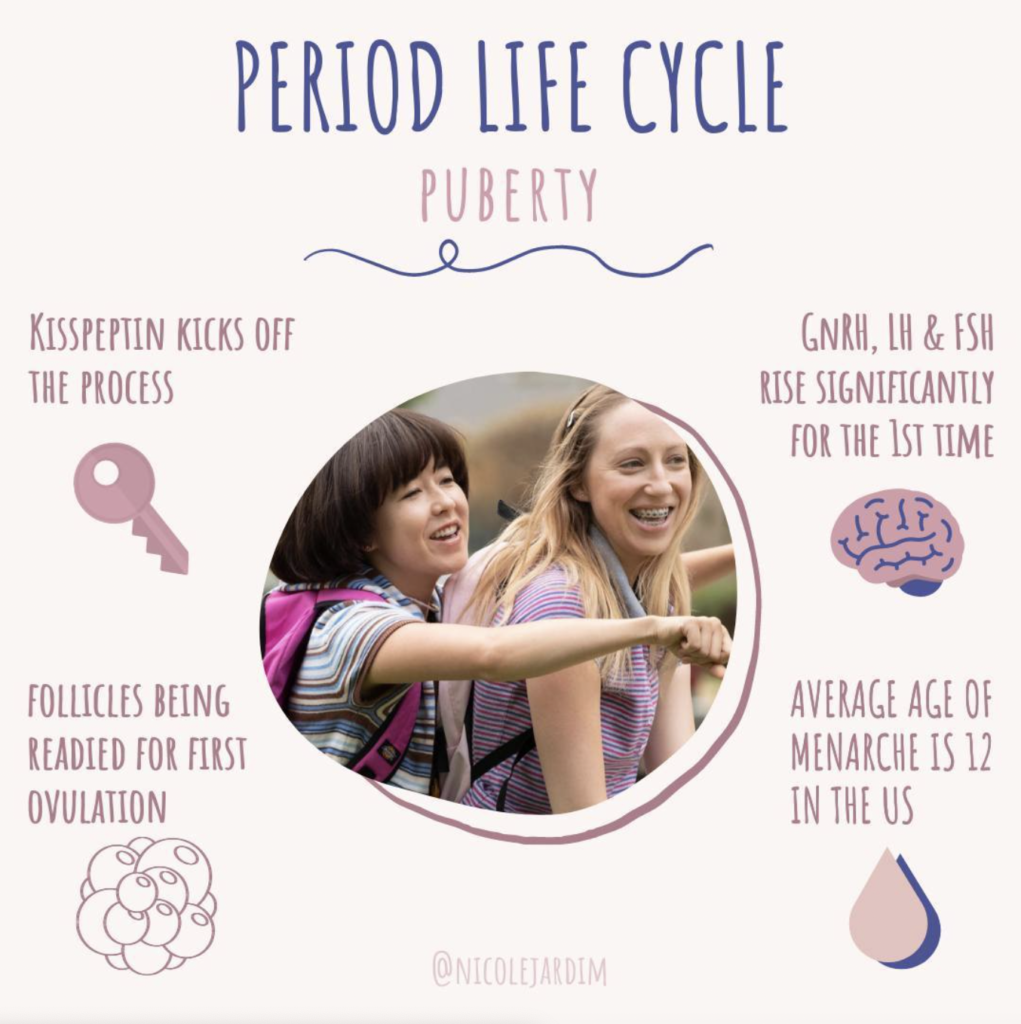
MENSTRUAL LIFE CYCLE PART 1: PUBERTY
Let’s start by talking about the biology of puberty, and what’s going on leading up to the first period (called menarche).
Have you ever heard of kisspeptin? Kisspeptin is like the gatekeeper of puberty. 🔑
It is the main regulator of the pulsatile secretions of GnRH (gonadotropin releasing hormone).
So basically kisspeptin is the boss of GnRH!
It plays a role in kicking this entire operation off because it stimulates the pulsatile secretion of GnRH, which then stimulates the pituitary gland to produce LH & FSH. 👯♀️
These hormones then act on the ovaries to promote follicle development (which leads to the first ovulation), and the production of the sex hormones we’ve all come to know and love, estrogen and progesterone. 💞
This in turn creates the feedback loops 🔁 that regulate the production of FSH & LH in subsequent menstrual cycles throughout the lifespan.
What’s the normal age for a first period?
The average age of menarche in the US is 12 years old, but periods can begin as young as 8.
If a period has not begun by 16, please see a doctor for evaluation.
When did you get your first period and what was it like? Amazing, terrible, scary?🩸 Let me know over on IG.
Also check out these Period Party podcast episodes on Tween & Teen Periods:
What’s Normal For Teen & Tween Periods
Reframing Teenage Periods
Fertility Awareness for Tweens & Teens
Period Positivity
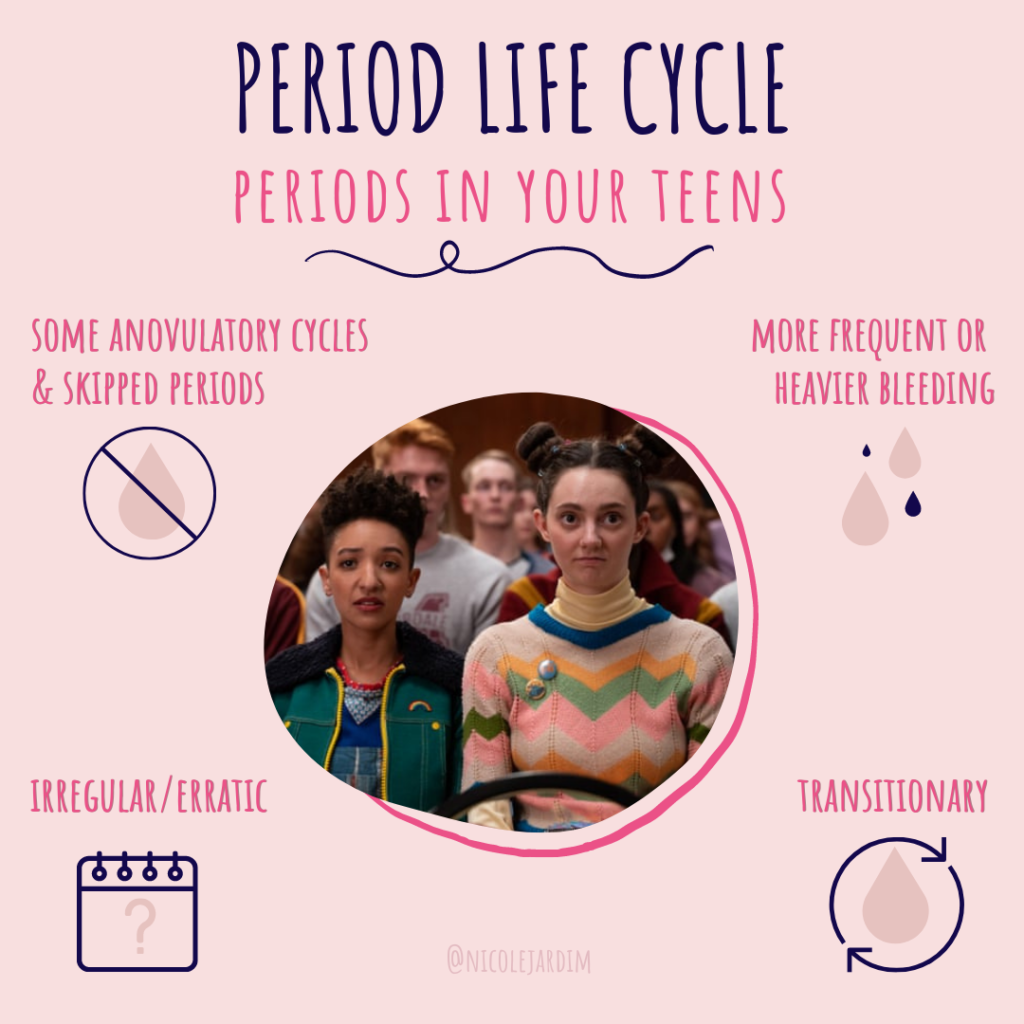
MENSTRUAL LIFE CYCLE PART 2: PERIODS IN YOUR TEENS
During puberty, you’ll go from a completely anovulatory state to a state of regular ovulation and periods—a challenging transition.😳
And it’s completely normal that your periods reflect that transition by being a little all over the place.
Hello, erratic!
In the first 5-7 years after your initial period, as your reproductive system adjusts to its new role, you will likely experience occasional anovulatory cycles, slower follicle development, and a smaller dominant follicle than an adult.
What this looks like:
🌸 Skipped periods
🌸 Irregular cycles
🌸 More frequent or heavier bleeding (because of the lack of progesterone both to hold the uterine lining in place and to slow estrogen’s growth of the uterine lining).
Experiencing these symptoms as a teenager does NOT mean you have PCOS or will have trouble conceiving in the future.
And it definitely does not mean you need to be put on the birth control pill. (Actually, I’d argue quite the contrary!)
It simply means your body is learning how to do this new thing it does, and it may take a while to get its bearings.
➡️ This is why #periodliteracy is necessary from the start!
That said, teenage periods are just as susceptible to the effects of food and lifestyle! Here are warning signs that may indicate something’s off:
🚫 Missing period or lack of ovulation
🚫 Severely heavy bleeding or periods that last 8+ days
🚫 Extreme period pain
🚫 Consistently having two bleeds in one month
Check out my book Fix Your Period – the tools are applicable for teens, too!
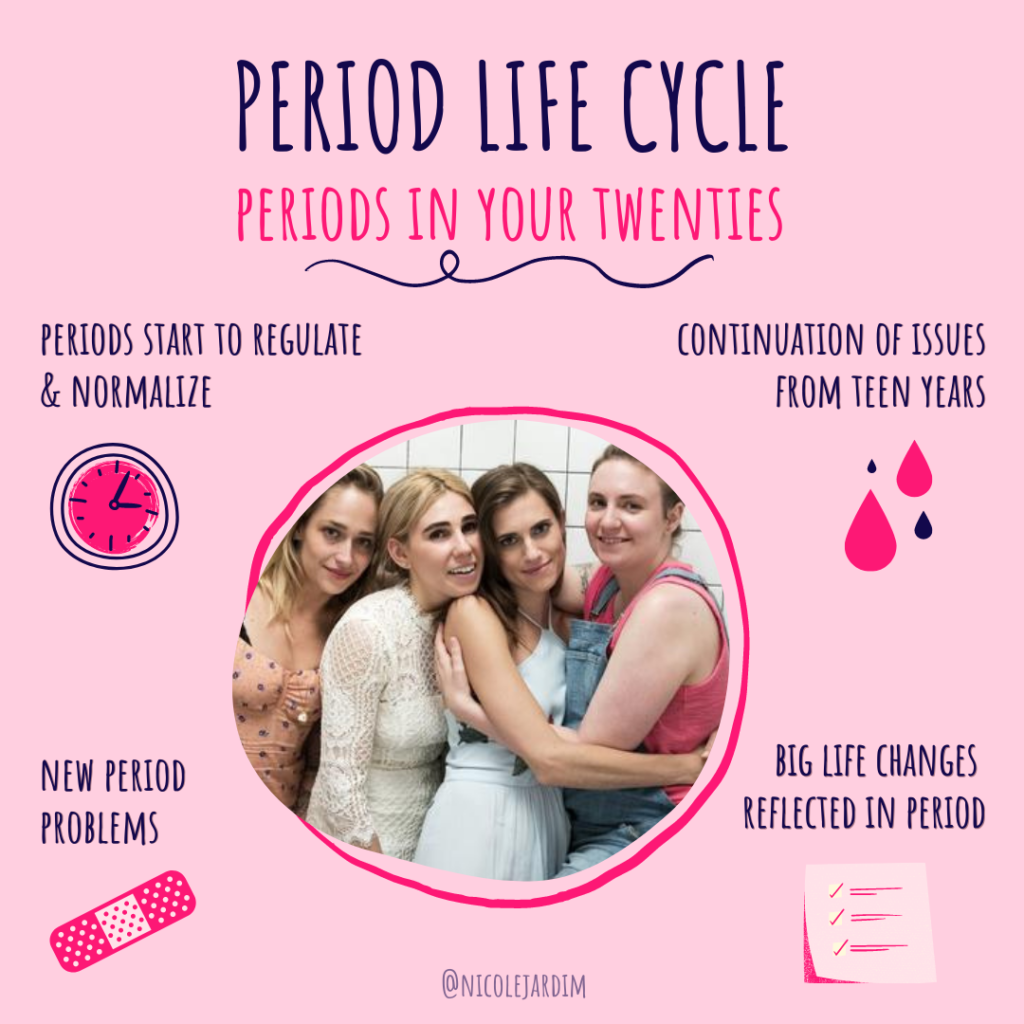
MENSTRUAL LIFE CYCLE, PART 3: PERIODS IN YOUR TWENTIES
Oh, your twenties! Such an exciting and emotionally debilitating decade, full of confusion and loneliness and—what the hell am I doing with my life? 🤣
Your 20’s are a rite of passage in so many ways.
And now that you’ve left your tumultuous teenage years behind you, it’s time to really own your menstrual cycle.
This phase of the menstrual life cycle often involves a lot of life changes such as college, graduation, getting a first job or starting a business, moving into your own place, and possibly getting married and having kids.
The excitement (and stress) of these big life adventures will affect your hormones in a multitude of ways, and I’ve found that most women in their 20s who are not on hormonal birth control notice one of three things:
1️⃣ They experience a continuation of their issues from puberty.
2️⃣ Their periods start to regulate and normalize.
3️⃣ They start developing period problems they didn’t experience as a teen.
Regardless of which camp you’re in, paying attention to the foundations of health—diet, stress management, and proper supplementation—is critically important during these years.
Luckily, you have youth and thus, hormonal resilience on your side, so you’ll find you feel better within a short period of time.
Kind of like everything in your 20s (colds, hangovers, and boyfriends)—you’ll bounce back fast from period problems if you implement a few key practices.
A good place to start? My period quiz!
P.S. the 20s are also a time when a lot of women go on hormonal birth control. Please know that if you are on hormonal birth control, you’re not getting a real period but rather a withdrawal bleed. More info on that in this post.
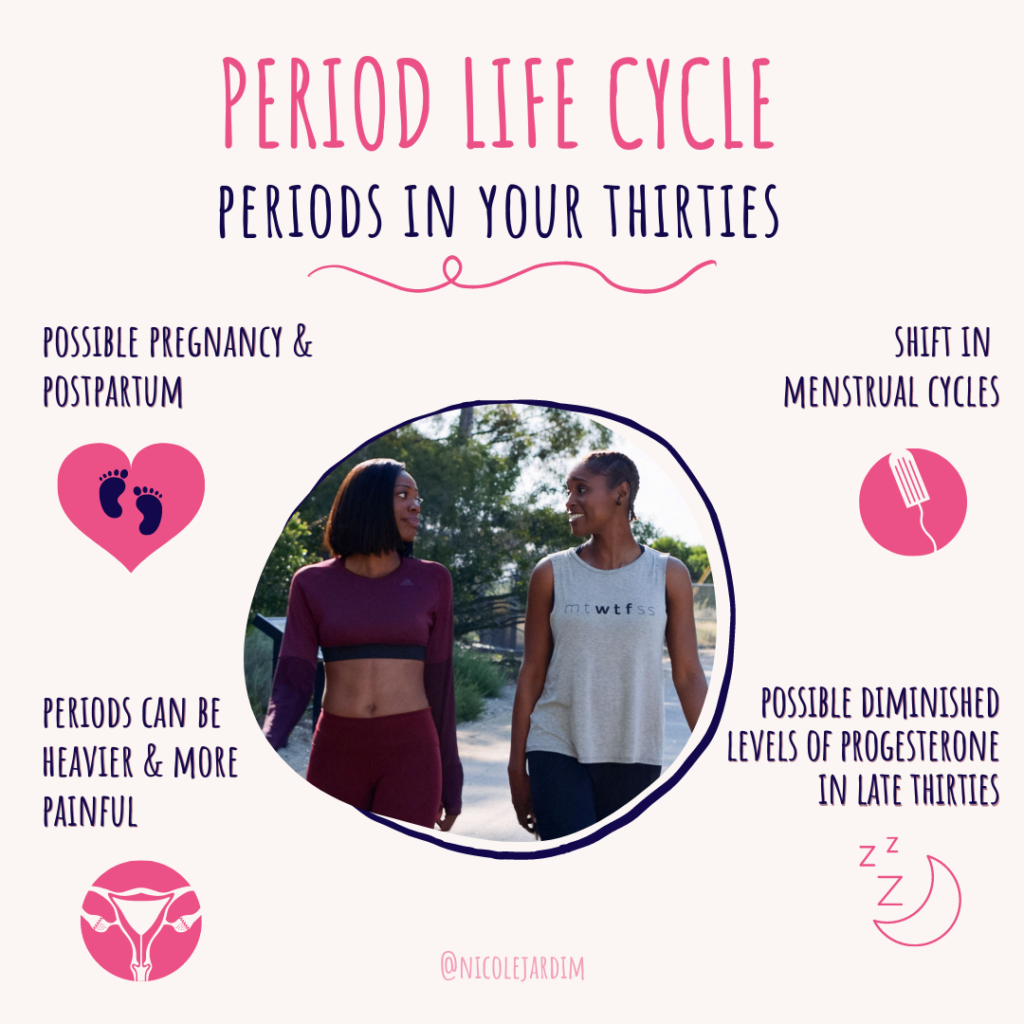
MENSTRUAL LIFE CYCLE, PART 4: PERIODS IN YOUR THIRTIES
Like your 20s, your 30s can be characterized by pregnancy and postpartum.
But what does this mean for your period, exactly?
Many of my clients have reported a complete reset of their hormonal equilibrium and periods that changed significantly postpartum. 🤰🏻➡️🤱🏻
For some, periods are heavier and more painful after giving birth, while others have said their periods were lighter and less painful.
Menstrual cycle length in the first few cycles after ovulation returns can also vary widely.
Even if you don’t experience pregnancy, one of the biggest concerns is a shift in menstrual cycles in the early thirties.
You might start to notice your cycles getting shorter and your periods getting heavier during this time, OR your periods could shorten and get lighter. 🤔
I chalk this up to the dietary, stress, and environmental burdens that often increase in our 30s, and the fact that our guts and livers are not as resilient to these stressors as they were when we were in our 20s.
WHAT ABOUT PERIMENOPAUSE?
The transition period between our regular cycling years and the onset of menopause officially begins at age 35, but you don’t just suddenly start experiencing symptoms.
What most women notice as they approach 40 is a few anovulatory cycles each year, which lead to diminished levels of progesterone.
Lower progesterone causes an increase in sleep issues—such as difficulty sleeping through the night, along with worsening moods—especially in the late luteal phase. 💤
Otherwise, it should be business as usual for women in their mid-to-late thirties who are ovulating and menstruating on the regular! 💼
If that’s not the case for you, then get my Harness Your Hormones 28 Day Program as a first step!
For those of you in your flirty 30s, how has your period evolved during this phase? Let me know in the comment section ⬇️
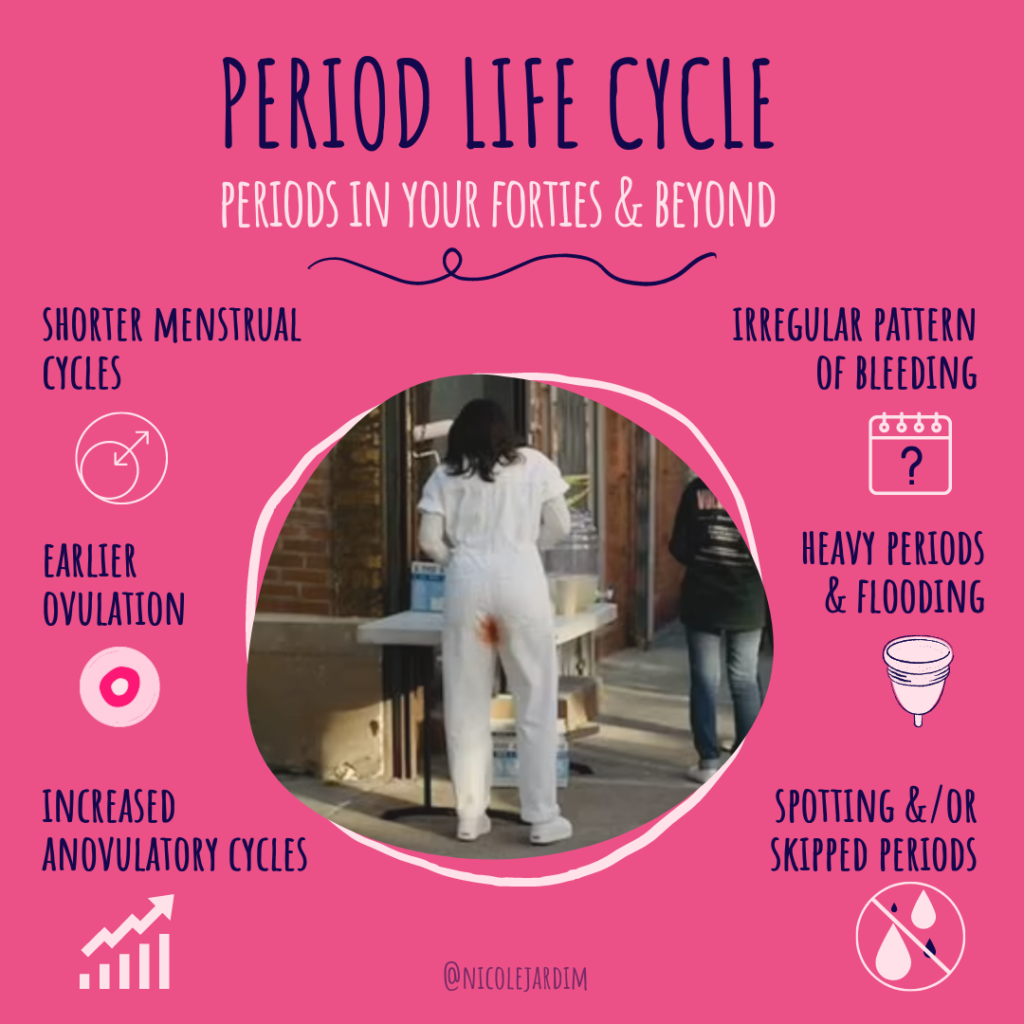
MENSTRUAL LIFE CYCLE, PART 5: PERIODS IN YOUR FORTIES (AND BEYOND)
Dear Charlotte, I’m sorry that Carrie and Miranda made such a big deal about your “flash period” LEAK, when you thought you were done menstruating.
Honestly, when are we gonna get over this people?! Periods happen.
But I digress. Let’s talk about periods in your 40’s & beyond!
Okay, y’all, this is where it gets interesting.
While your 20s and 30s tend to be pretty consistent for the most part, your 40s are gonna be a different story…
Just like the time after your first period, the decade leading up to your ovaries shutting their doors🚪 for good and your very last period can be rather…um, well, turbulent. 🌩️
But that’s not always the case! In fact, perimenopause does NOT have to be terrible, and suffering during this transition time is optional. But there are a few things to be aware of.
As perimenopause gets underway, women tend to experience:
- earlier ovulation
- shorter menstrual cycles
- increased anovulatory cycles
- decreased progesterone, which leads to heavy periods, or flooding and mood issues
This decrease in progesterone relative to estrogen (also known as estrogen dominance or estrogen excess) can go on for a number of years.
As a result, some women experience an irregular pattern of bleeding, with some months being heavy + long while others are short + light.
There may also be spotting (at different times in the cycle), and most women will start to skip periods here or there during this phase of perimenopause.
As menopause gets closer, things begin to shift. FSH & LH begin to rise, and estrogen starts to drop 📉 along with progesterone, which leads to longer and longer menstrual cycles and fewer periods each year.
Menopause officially starts once you’ve ceased to have a period for 12 months. Not so scary after all!
(Unfortunately Charlotte was not aware of this 12 month rule and really thought she was done.) 😅
For more info on this, check out my interview about what’s happening with your hormones during perimenopause, with Dr. Mariza Snyder over on The Period Party Podcast.
Wherever you are in your menstrual life cycle, I hope you enjoy the ride!
